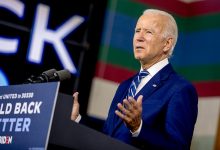The Morrison government could soon find itself under immense pressure to dramatically improve its climate change policies, with the prospect of a Biden presidency in the United States that could usher in a new era of global climate change leadership that would banish Australia – once again – to the ‘naughty corner’.
Speaking to the Clean Energy Council’s Australian Clean Energy Summit Webinar Series, economist Ross Garnaut speculated that a potential change in the United States presidency could change the game for Australia’s climate and energy policy.
The election of Democratic nominee Joe Biden to the presidency could see a complete turnaround from one of Australia’s leading allies, ousting a Trump administration that has bulldozed US climate regulations, and replacing it with a Democratic president ready to embrace a multi-trillion dollar Green New Deal.
A future United States under a Biden presidency would bring the global superpower back into the fold on climate action and, according to Garnaut, this could see Australia castigated for its recent record as a spoiler in both local and international climate change policy development.
“I do know that current Australian policies would be seen as being an abnegation of the international public interest by a Biden government,” Garnaut told the Clean Energy Council summit.
“We would be in the naughty corner on an issue that will probably be the main issue, other than economic recovery after Covid. And that’s not a very comfortable position for an Australian government to be in.”
This week marked less than 100 days until the election day for the 2020 US presidential election and while that remains a long time in politics, Democratic nominee Joe Biden currently holds a significant lead in polling over incumbent US president Donald Trump.
“[Under Biden] the US is likely to move from being strongly resistant to action on climate change and trying to break up global cooperation on this matter, to being a very aggressive leader of action,” Garnaut added.
Trump has suffered a loss in approval amongst US votes, in reaction to his poor handling of the Covid-19 pandemic, which has seen the US lead the world in both Covid-19 cases and deaths, as well as ongoing violent clashes between Black Lives Matter protesters and enforcement authorities fuelled by Trump’s deployment of federal officers.
Garnaut suggested that a rare positive of the way that Trump has mishandled the Covid-19 pandemic was that it could deliver power to a new president who will embrace strong leadership on climate change.
“How has Covid affected the prospects for the Australian and the global energy transition? The way it has gone is actually highly favourable for the climate transition. That it undermines the legitimacy of the most important climate-denying government in the world, the government of President Trump.
“Nothing is certain in democratic politics, and it’s not certain he’ll be defeated in November, but it’s very likely that he will be.
“The Democratic Party in the US is more strongly committed to strong action on climate change than it’s predecessors in the Obama Administration,” Garnaut added.
While a Biden administration is likely to see the United States re-emerge as a global leader on climate change action, there are opportunities for Australia in a global economy that can flow from a global embrace of a low emission economy.
Biden has already committed to a $US2 trillion investment in clean energy for the United States and will pursue a target of 100 per cent renewables and zero net emissions no later than 2050. It is expected to reverse the withdrawal from the Paris climate treaty that is due to take place one day after the election is held.
Biden’s commitments represent a huge leap forward compared to the Morrison government, which has set no emissions reduction target beyond its weak commitments to 2030 and has no future targets for renewable energy adoption in Australia.
However, Australia holds a huge competitive advantage over other countries in terms of access to both renewable energy resources and the raw materials required to supply global manufacturing markets.
According to Garnaut, to take advantage of that competitive advantage will require advancements in emerging clean energy technologies, particularly green hydrogen, which will allow coal and gas to be displaced from a number of heavy industries.
The opportunity that exists for Australia is to emerge as a leading producer of green steel, Garnaut told the summit, as it was likely to be cheaper to use locally produced hydrogen to produce zero emissions steel, and more expensive to export hydrogen and iron ore to then be processed overseas.
“It will be much more expensive to convert renewable energy into hydrogen, and then convert hydrogen into a tradable form, and then use it for reducing Australian iron oxide into iron metal in China, Korea and Japan, than it will be to do those early stages in Australia and take the iron metal to East Asia,” Garnaut said.
However, there may still be opportunities for Australia to emerge as a renewable energy export power through the supply of renewable energy in the Asian region. Such projects include the massive Sun Cable initiative which was this week given a ‘major project’ designation by the federal government for expedited planning assessment, and the Asian Renewable Energy Hub being developed by CWP Renewables.
“With competitive and dispatchable renewable electricity, the growth of electricity demand in the ASEAN region will go up even faster than it has been for the last few years. So it’s a huge market,” Sun Cables Australia CEO David Griffin told the summit.










